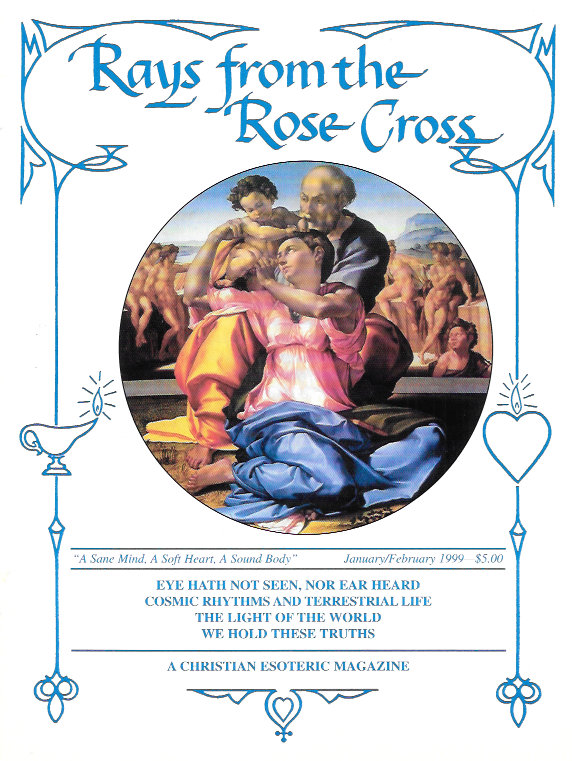
| rosicrucianU.com | ||
| Simplified Scientific Christianity |

"Thou shalt not covet thy neighbor's house; thou shalt not covet thy neighbor's wife, nor his man-servant, nor his maid-servant, nor his ox, nor his ass, nor anything that is thy neighbor's."
This Commandment is the last given to Moses in the wilderness on Mount Sinai. Metaphysically, this desert signifies a place of confused and undisciplined thoughts on one hand, and a place of earnest searching after truth on the other. Today, too, we find ourselves amid bewildered and undisciplined thoughts and feelings, but our inner promptings have called us to Mount Sinai where our higher minds can commune with God. And God does commune with us. The tenth Commandment is proof. But it does take the intermediary Moses, or the higher mind, to break through the trite and trivial exterior that protects the seed of potent beauty within the Commandment.
The first seven Commandments disclose the benevolent rules needed to bring about order in the kingdom of God. The next three speak of the tripartite power of God, and the two Commandments of the New Testament reveal to us the glory of God.
The threefold lessons on power — the power to create, the power to attain, and the power to control — are neatly packaged in the three Commandments: Thou shalt not steal; Thou shalt not bear false witness; Thou shalt not covet.
The tenth Commandment has an additional virtue: it serves as a link, as do the second and seventh Commandments. The second is a link between head and heart; the seventh is the balance wheel between body and soul. The tenth is the link between the spiritual and the divine man.
(A spiritual person is one who, in a measure, demonstrates the power of God).
To covet means to desire enviously, to desire for selfish ends. The tenth commandment does not refer to the deeds and misdeeds of the physical and vital bodies; it refers to the desire body. Transgressions of the other Commandments are quickly apparent; there follows punishment, contrition, remorse. Not so in coveting.
"Thou shalt not covet thy neighbor's wife." The love within us is our very life essence. Of this love we may give freely. But we may not covet the love of another for our own self-satisfaction. We may not covet another person's love. In love, only one law pertains: freely give. Thus, the admonition not to covet thy neighbor's wife is our preparation for the supreme lesson in love that will follow in the "eleventh Commandment."
In the womb, during prenatal life, we belong exclusively to ourselves; we are alone and entirely dependent. But at birth, the moving of the tenth month, we become part of a larger world. We are no longer alone; we are a part of the galaxy of human beings and, as we grow, we must assume the responsibility to fit in, to bring maximum power to the whole. A chain is no stronger than its weakest link. The chain of the human universe expects us to make ourselves strong links. Strength, therefore, is the keyword of this Commandment.
From the first through the ninth Commandments, from the corresponding zodiacal signs Aries through Sagittarius, from the head to the thigh, the esoteric understanding sublimates organ after organ. These organs are indispensable to physical — but not so knees, calves, ankles, and feet. Physically, we can live without these, but they are parts indispensable to the divinity in man, in their esoteric meaning. Whereas the nine major organs of the body work automatically, the knees, ankles, and feet work only by our conscious volition. The knees do not bend unless we so will. The tenth Commandment strengthens the will and the knees by control of desire
The Virgin Spirit awakens in the dawn of the tenth Commandment. It awakens to its glorious immortality, the Ego is released, the potential seed becomes potent, the Ego becomes conscious of its great heritage and responsibility in the scheme of evolution through the magic of self- control. Under the number ten and the corresponding sign Capricorn, man finds redemption from mortal existence and sorrow. In Capricorn, man rises victorious over the substance of the inferior nature through self-control. Self-control is the Savior, the Christ, born in Capricorn at Christmastime.
The Lords of Capricorn, the Archangels, are the Hierarchy of the Desire World, and Christ is their highest Initiate. The Christ of Capricorn is He of Whom it is said: He came not to bring peace, but a sword. Christ in this Commandment summons the world to intense activity and stern labors. Before we are ready to enter the sign Aquarius, the 28th degree of Capricorn, where Mars is exalted, has to be reckoned with. At the point of Mars' exaltation, life pushes a sword into our hands. It is the sword that conquers the tempter. It is the sword of fearlessness, and this is the only weapon permissible to a Christian. The exaltation of Mars is controlled action and controlled desire. The virtue of controlled action and desire is fearlessness. This sword of fearlessness is never used to strike, it is never raised, it never wounds. Nevertheless, it is the symbol of power. Fearlessness in its early stages of becoming is non-resistant to evil; later, when fully grown, it puts evil to flight by divesting it of its power. Its secret is the strength of self-control.
Capricorn in the body represents the knees. The strength of the knees is the symbol of fearlessness. Fearfulness causes the knees to tremble. Fearlessness gives strength to the knees. The knees are a door into the temple of the Most High. We reach the door of that temple on bended knee.
Thou shalt not covet; thou shalt not covet thy neighbor's love but thou shalt harness the power of thy desire; thou shalt strengthen thy will and fit thyself to a strong link in the hierarchy of man.
— Rays from the Rose Cross Magazine, March, 1977, page 118-119.

|

|

|
|
|
Contemporary Mystic Christianity |
|
|
This web page has been edited and/or excerpted from reference material, has been modified from its original version, and is in conformance with the web host's Members Terms & Conditions. This website is offered to the public by students of The Rosicrucian Teachings, and has no official affiliation with any organization. | Mobile Version | |
|